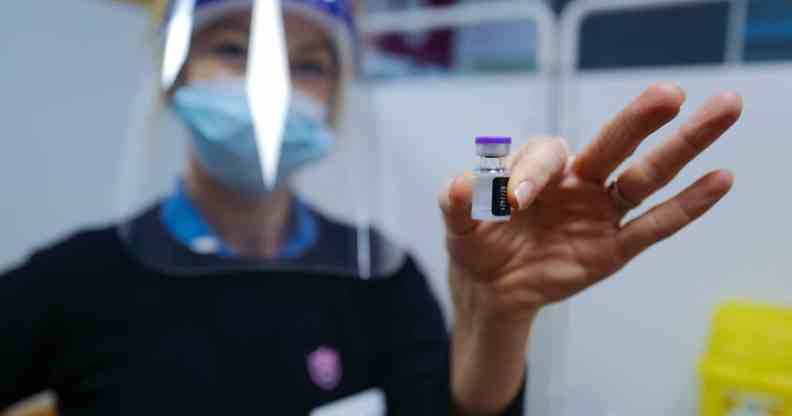People living with HIV to receive coronavirus vaccine alongside cancer patients, diabetics and severe asthmatics

A nurse in a UK hospital prepares to administer COVID-19 vaccinations. (Getty/Hugh Hastings)
Public Health England has finally confirmed where people living with HIV land on the coronavirus vaccine priority list.
On Tuesday (8 December) the UK became the first country in the world to start administering the Pfizer/BioNTech vaccine after it was approved my regulators last week.
The government has now released the order of priority in which the vaccine will be given out, and those who are HIV-positive will be in the sixth group, along with other “adults aged 18 to 65 years in an at-risk group”.
“At-risk” adults also include those undergoing chemotherapy or radiotherapy, people diagnosed with a blood cancer like leukaemia, and people with severe asthma, diabetes, heart problems or kidney disease. The group also includes those with a severe mental illness or learning disability.
The sixth risk group follows care home residents and staff, those over and 80 and health and social care workers, people over 75, people over 70 and the extremely clinically vulnerable individuals, and people over the age of 65.
Some studies have shown that those living with HIV are at an increased risk of dying from COVID-19 and, although information is conflicting, one small London study found that HIV-positive people with low CD4 cell counts were more likely to be admitted to hospital with COVID-19 than other people with HIV, according to HIV and AIDS charity NAM/ aidsmap.
NAM/aidsmap executive director Matthew Hodson told PinkNews: “Although there is little evidence that people living with HIV are more likely to acquire COVID, there may be a slightly increased risk of dying from COVID-19.
“People who are not virally suppressed on treatment for HIV are likely to be at greater risk. COVID has underlined the importance of prompt HIV diagnosis and treatment access.
“Some of the vaccines, such as the Oxford and Pfizer vaccines, specifically recruited people living with HIV, although the full results of these studies have not yet been released.
“On a personal level, as someone who has been living with HIV for 22 years, I will not hesitate to get vaccinated.”
Vaccine misinformation has been spreading like wildfire on social media, and this is no different when it comes to the safety of the coronavirus vaccine for people with HIV.
NHS HIV consultant Dr Rageshri Dhairyawan wrote on Twitter: “A WhatsApp message is circulating saying that people living with HIV should not accept the vaccine, as it is a way for the government to kill them, as they are too expensive to look after on the NHS. THIS IS NOT TRUE. It’s vital we discuss people’s fears!”
Made sure to recommend Covid-19 vaccines to all of my patients in clinic today. A lot of concerns, so it was great to discuss & address them. Interestingly, some people said it was reassuring to hear I was going to get one, as it made them feel more confident about them.
— Dr Rageshri Dhairyawan (@crageshri) December 8, 2020
She added: “Made sure to recommend COVID-19 vaccines to all of my patients in clinic today. A lot of concerns, so it was great to discuss and address them.
“Interestingly, some people said it was reassuring to hear I was going to get one, as it made them feel more confident about them.”
The British HIV Association has produced a plain English guide to the vaccine for people who are HIV-positive.

